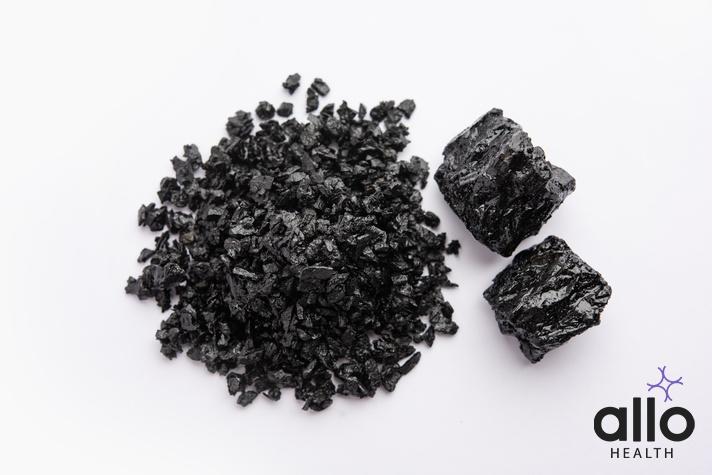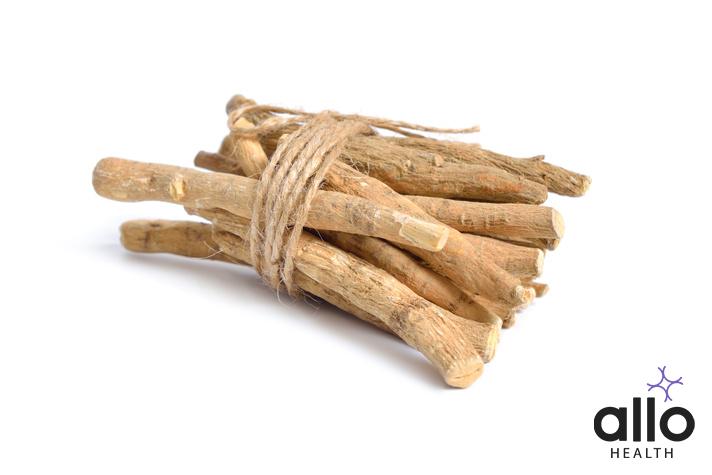Ayurvedic Viagra For Females: What You Need To Know

Allo Health is dedicated to personalized well-being, offering support and trusted information tailored to individual health goals. The platform emphasizes human-generated content, led by a distinguished medical team of experts, including physicians and sexual health specialists. Their commitment to credibility involves rigorous fact-checking, authoritative research, and continuous updates to ensure accurate, up-to-date information. Allo Health's unique approach goes beyond conventional platforms, providing expert-led insights and a continuous commitment to excellence, with user feedback playing a crucial role in shaping the platform's authoritative voice.

Dr.Sushma.V completed MBBS degree from BGS GIMS,bangalore
Why This Was Upated?
Our experts continually monitor the health and wellness space, and we update our articles when new information became available.
Updated on 02 February, 2024
- Article was updated as part of our commitment to diversity, equity, and inclusion.

"The following blog article discusses alternative medicine practices and their potential effects or benefits. However, it is important to note that the information provided is for general educational purposes only and should not be considered as medical advice or a substitute for professional guidance from a qualified healthcare professional. Before considering any alternative medicine practices or treatments, it is recommended to consult with a healthcare professional.
Book consultation
Alternative medicine encompasses a wide range of practices that may not have undergone rigorous scientific evaluation or received widespread acceptance within the medical community. The effectiveness, safety, and appropriateness of alternative medicine practices can vary significantly depending on the individual, their specific medical conditions, and other factors.
It is important to approach alternative medicine practices with caution and skepticism. Some practices may carry potential risks or interact with existing medical treatments. A healthcare professional can provide guidance based on your medical history, evaluate the available evidence, and offer informed advice regarding the potential benefits and risks of alternative medicine practices.
Individuals with specific medical conditions, allergies, or taking medications should exercise particular caution when considering alternative medicine practices. Some practices may have contraindications or adverse effects, and it is essential to discuss these potential concerns with a healthcare professional before pursuing any alternative treatments."
Sexual wellness is an essential aspect of our overall well-being and it’s vital that we strive to maintain it throughout our lives. Unfortunately, female sexual dysfunction has become a prevalent concern affecting millions of women across the world, with many experiencing a loss of libido, low sexual arousal and difficulty achieving orgasm. While there are several conventional treatments available for female sexual dysfunction, many come with unwanted side effects and fail to address the root cause of the concern effectively. That’s where Ayurvedic Viagra comes in. Let’s explore the potential benefits and drawbacks of using Ayurvedic Viagra as a natural alternative for female sexual enhancement.
What Is Ayurvedic Viagra?
There isn’t a specific product known as “Ayurvedic Viagra” that is widely recognized or accepted. However, there are herbal and Ayurvedic remedies that claim to address concerns related to sexual health and performance, often marketed as alternatives to pharmaceutical drugs like Viagra.
Ayurveda is a traditional system of medicine that originated in India, and it emphasizes a holistic approach to health and wellness. Ayurvedic remedies for sexual health may include herbs, minerals and other natural substances that are believed to have aphrodisiac properties or enhance overall vitality.
Some common herbs used in Ayurveda for sexual health include:
- Ashwagandha (Withania somnifera): It is believed to have adaptogenic properties, helping the body cope with stress and supporting overall vitality.
- Shilajit: A mineral pitch that is rich in fulvic acid and minerals, often used in Ayurveda for rejuvenation and to enhance strength and stamina.
- Safed Musli (Chlorophytum borivilianum): Touted for its aphrodisiac properties, it is believed to enhance sexual performance.
- Gokshura (Tribulus terrestris): Traditionally used for improving libido and fertility.
- Kapikachhu (Mucuna pruriens): Known for its potential to support male reproductive health and hormonal balance.
It’s important to note that while these herbs have been used traditionally in Ayurveda, scientific evidence supporting their efficacy in the context of sexual health may be limited or inconclusive. Moreover, the safety and effectiveness of herbal remedies can vary, and they may interact with medications or have side effects.
If you are experiencing concerns related to sexual health, it’s advisable to consult with a healthcare professional before trying any alternative remedies. They can provide personalized advice based on your health history and circumstances. Additionally, always purchase herbal supplements from reputable sources to ensure quality and safety.
Ayurvedic Viagra For Females
Ayurvedic Viagra Uses
In Ayurveda, there are herbs and natural remedies that have been traditionally used to address various aspects of women’s health, including concerns related to sexual well-being. It’s important to note that the efficacy and safety of these remedies can vary and scientific evidence supporting their use may be limited.
Some Ayurvedic herbs that have been traditionally associated with female reproductive health and wellness include:
- Shatavari (Asparagus racemosus): Often referred to as the “queen of herbs” in Ayurveda, Shatavari is believed to support female reproductive organs and hormonal balance.
- Ashoka (Saraca asoca): Traditionally used to support women’s reproductive health, especially in conditions like menstrual irregularities.
- Lodhra (Symplocos racemosa): Regarded for its potential to address concerns related to women’s health, including menstrual disorders.
- Gokshura (Tribulus terrestris): While often associated with male health, Gokshura is also used in Ayurveda for women to support reproductive health.
- Kumari (Aloe vera): Aloe vera is believed to have cooling properties and may be used to address conditions associated with inflammation or heat imbalance.
It’s crucial to emphasize that individual responses to herbal remedies can vary, and not all herbal products are regulated or undergo rigorous testing for safety and efficacy. Before considering any Ayurvedic remedy for female sexual health, it is advisable for individuals to consult with a healthcare professional, preferably one with expertise in both conventional medicine and complementary or alternative approaches. This is especially important to ensure that any potential underlying health concerns are properly addressed, and to prevent potential interactions with medications or adverse effects.
As practices and information in healthcare can evolve, it’s recommended to check for the latest and most reliable sources of information for any developments or new insights in this area.

Ayurvedic Viagra Side Effects And Precautions
If you are considering the use of any Ayurvedic herbs or remedies for female sexual health, it’s important to be aware of potential side effects and take necessary precautions. Keep in mind that individual responses to herbal remedies can vary and not all herbal products are regulated or thoroughly researched.
Here are some general precautions and considerations when using Ayurvedic remedies for female sexual health:
- Consultation with a Healthcare Professional: Before trying any herbal remedy, especially if you have underlying health conditions or are taking medications, consult with a healthcare professional. This includes healthcare providers who are knowledgeable about both conventional medicine and alternative therapies.
- Quality and Source: Ensure that the Ayurvedic products you consider are obtained from reputable sources. Quality control and purity can vary among different brands and suppliers.
- Dosage and Duration: Follow the recommended dosage instructions provided by the manufacturer or healthcare professional. Avoid exceeding recommended doses, as this can increase the risk of adverse effects.
- Potential Interactions: Be aware of potential interactions with other medications you may be taking. Some herbs may interact with prescription or over-the-counter drugs, affecting their effectiveness or increasing the risk of side effects.
- Allergies and Sensitivities: If you have known allergies to certain herbs or substances, carefully check the ingredients of Ayurvedic products to avoid potential allergic reactions.
- Pregnancy and Breastfeeding: If you are pregnant, breastfeeding, or planning to become pregnant, consult with a healthcare professional before using any herbal remedies, as certain herbs may have effects on pregnancy or lactation.
- Monitoring for Side Effects: Pay attention to how your body responds to the herbal remedy. If you experience any adverse effects, discontinue use and consult a healthcare professional.
- Regular Health Check-ups: Continue with regular health check-ups and screenings. Herbal remedies should not be considered a substitute for routine healthcare.
It’s important to note that the safety and efficacy of herbal remedies, including those in Ayurveda, may not be supported by robust scientific evidence. Therefore, exercise caution, and prioritize open communication with your healthcare provider when considering such treatments. Always stay informed about the latest research and healthcare guidelines related to herbal remedies.
Ayurvedic Viagra Drug Interactions
While there isn’t a recognized “Ayurvedic Viagra” for females, various Ayurvedic herbs and remedies are often used to address aspects of women’s health, including sexual well-being. It’s important to be aware of potential drug interactions if you are considering the use of Ayurvedic herbs alongside conventional medications. However, it’s crucial to note that information on specific drug interactions with Ayurvedic herbs can be limited, as comprehensive studies may not have been conducted.
Here are some general considerations regarding potential drug interactions:
- Consult with Healthcare Professionals: Always consult with your healthcare provider before using any Ayurvedic herbs, especially if you are taking prescription medications. Healthcare professionals can provide personalized advice based on your specific health conditions and medications.
- Blood-Thinning Medications: Some Ayurvedic herbs may have blood-thinning properties. If you are taking anticoagulant or antiplatelet medications (e.g., warfarin or aspirin), it’s essential to discuss potential interactions with your healthcare provider, as combining these substances could increase the risk of bleeding.
- Hormone-Related Medications: Ayurvedic herbs like Shatavari may have hormone-regulating effects. If you are taking hormonal medications (e.g., birth control pills or hormone replacement therapy), discuss potential interactions with your healthcare provider.
- Diabetes Medications: Some Ayurvedic herbs may affect blood sugar levels. If you are taking medications for diabetes, it’s important to monitor your blood sugar levels closely and inform your healthcare provider if you plan to use herbal remedies.
- Blood Pressure Medications: Certain Ayurvedic herbs may have effects on blood pressure. If you are taking medications for hypertension, consult your healthcare provider to ensure that combining these substances won’t interfere with the effectiveness of your prescribed medications.
- Liver Function: Some herbs may impact liver function. If you are taking medications that affect the liver, such as certain statins or antifungal medications, discuss potential interactions with your healthcare provider.
- Immune System Modulators: Ayurvedic herbs like Ashwagandha may have immune-modulating effects. If you are taking medications that affect the immune system (e.g., immunosuppressants), consult with your healthcare provider.
Always disclose all the medications, supplements, and herbal remedies you are using to your healthcare provider to receive comprehensive guidance on potential interactions. This information is based on general principles, and individual responses can vary, so personalized advice from a healthcare professional is crucial.
Difference Between Ayurvedic Viagra and ‘Normal’ Viagra
Ayurvedic Viagra:
- Ingredients: Ayurvedic Viagra would typically involve herbal ingredients that are rooted in Ayurvedic medicine. Common herbs might include Ashwagandha, Shilajit, Safed Musli, Gokshura, and others believed to have aphrodisiac properties.
- Holistic Approach: Ayurvedic remedies often take a holistic approach to health, addressing overall well-being rather than just targeting specific symptoms. These remedies may aim to balance the body’s energies and improve vitality.
- Cultural and Traditional Basis: Ayurveda is an ancient system of medicine with deep roots in Indian culture. Ayurvedic treatments are often based on traditional knowledge and practices passed down through generations.
- Limited Scientific Evidence: While these herbs have been used traditionally, scientific evidence supporting their efficacy for sexual health is often limited or inconclusive.
Conventional Viagra (Sildenafil):
- Active Ingredient: Viagra, a brand name for the drug sildenafil, is a phosphodiesterase type 5 (PDE5) inhibitor. Sildenafil works by increasing blood flow to the genital area, aiding in achieving and maintaining an erection.
- Pharmaceutical Approach: Viagra is a pharmaceutical drug developed through rigorous scientific research and clinical trials. It is prescribed for the treatment of erectile dysfunction and works by targeting a specific physiological mechanism in the body.
- Quick Onset of Action: Viagra is known for its relatively rapid onset of action, typically within 30 minutes to an hour after ingestion.
- Regulated and Standardized: Pharmaceutical drugs like Viagra are subject to strict regulation, ensuring quality, safety and consistency in each dose.
- Prescription Requirement: Viagra is a prescription medication, and its use should be supervised by a healthcare professional. It is not intended for recreational use.
General Considerations:
- Safety and Efficacy: Conventional medications like Viagra undergo extensive testing to demonstrate safety and efficacy. The same level of scientific scrutiny may not be applied to all Ayurvedic remedies.
- Consultation with Healthcare Professionals: Before using any product claiming to be an “Ayurvedic Viagra” or similar, it is crucial to consult with a healthcare professional to ensure safety, especially if you have underlying health conditions or are taking other medications.
It’s important to note that developments and new products may have emerged since my last update in January 2022. Always consult with healthcare professionals and rely on the most recent and reputable information when considering treatments for health concerns.

Frequently Asked Questions
Most Asked Questions
-
What is Ayurvеdic Viagra for fеmalеs?
Ayurvеdic viagra for fеmalеs rеfеrs to hеrbal rеmеdiеs rootеd in Ayurvеdic mеdicinе that aim to addrеss aspеcts of womеn's sеxual wеll-bеing. Thеsе rеmеdiеs oftеn includе hеrbs likе Shatavari, Ashoka, and Gokshura, bеliеvеd to havе propеrtiеs supporting rеproductivе hеalth and hormonal balancе.
-
How Doеs Ayurvеdic Viagra for fеmalеs work?
Ayurvеdic rеmеdiеs for fеmalеs arе thought to work by balancing thе body's еnеrgiеs and addrеssing factors that may contributе to sеxual hеalth issuеs. For еxamplе, Shatavari is bеliеvеd to support fеmalе rеproductivе organs, whilе Gokshura may contributе to hormonal balancе.
-
Arе thеrе known sidе effеcts of Ayurvеdic Viagra for fеmalеs?
Whilе Ayurvеdic rеmеdiеs arе gеnеrally considеrеd safе, individual rеsponsеs can vary. Common hеrbs usеd may havе mild еffеcts, but allеrgic rеactions or intеractions with mеdications arе possiblе. It's crucial to consult with a hеalthcarе profеssional bеforе usе, еspеcially if you havе еxisting hеalth conditions.
-
Can Ayurvеdic Viagra for fеmalеs intеract with mеdications?
Yеs, Ayurvеdic hеrbs may intеract with cеrtain mеdications. It's еssеntial to inform your hеalthcarе providеr about any hеrbal rеmеdiеs you plan to usе, particularly if you arе taking prеscription mеdications. This hеlps prеvеnt potеntial intеractions and еnsurеs your ovеrall wеll-bеing.
-
Is Ayurvеdic Viagra for fеmalеs a substitutе for convеntional mеdical trеatmеnt?
Ayurvеdic rеmеdiеs arе not substitutеs for convеntional mеdical trеatmеnts. Whilе thеy may complеmеnt ovеrall wеll-bеing, thеy should bе viеwеd as part of a holistic approach to hеalth. Consult with a hеalthcarе profеssional for comprеhеnsivе advicе, еspеcially whеn addrеssing spеcific hеalth concеrns or conditions.






































